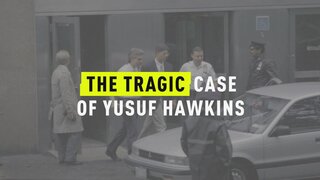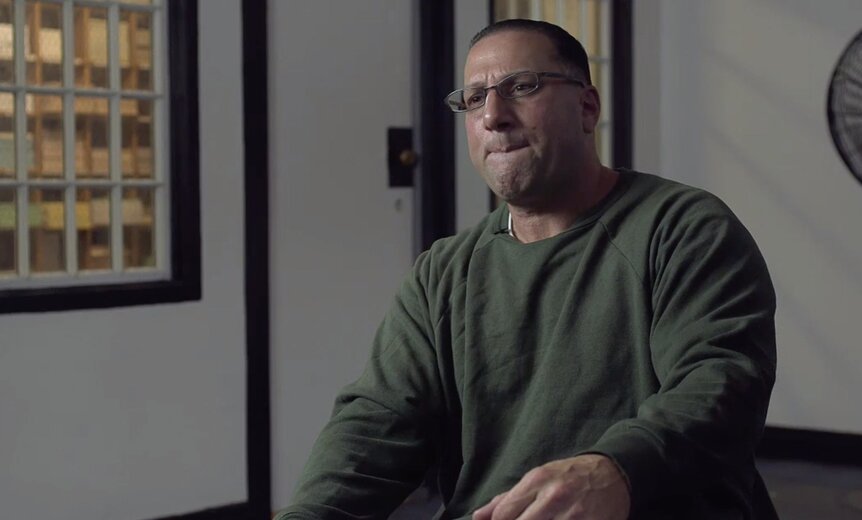Create a free profile to get unlimited access to exclusive videos, breaking news, sweepstakes, and more!
What Happened To Joseph Fama, The Man Convicted Of Killing Yusuf Hawkins?
"I don't know who shot Yusuf Hawkins, but it wasn't my friends and it wasn't me," Joseph Fama says in the HBO documentary, "Yusuf Hawkins: Storm Over Brooklyn."

The man convicted of fatally shooting Black teenager Yusuf Hawkins decades ago still swears he didn't pull the trigger.
Joseph Fama remains adamant that he wasn't responsible for Hawkins' death on the night of Aug. 23, 1989 when the 16-year-old and his friends were attacked by a mob of largely white Bensonhurst residents.
"I don't know who shot Yusuf Hawkins, but it wasn't my friends and it wasn't me," Fama, now 49, said in the HBO documentary "Yusuf Hawkins: Storm Over Brooklyn." "Mere presence is not guilt. If that's the case, then 30 other people are guilty."
Fama is one of the few people from the Bensonhurst crew to speak in the documentary.
"It was only him and Russell [Gibbons] who had the courage to participate when it comes to the people from Bensonhurst," director Muta'Ali Muhammad told MEL Magazine.
Hawkins and his friends were only in the working class, largely Italian-American neighborhood to look at a used car and were attacked by a group organized by Keith Mondello, who had claimed his former girlfriend Gina Feliciano threatened to bring a bunch of Black people to the neighborhood to attack him.
Feliciano later told police that Mondello was the one who threatened her and had organized a mob in an attempt to attack Black and Hispanic friends she'd invited to a party that night. She said she warned those friends against showing up. Hawkins and his friends had no connection to the neighborhood besides the used car inquiry.
Fama claimed that he initially thought about leaving, but ended up sticking around.
"As we were getting in the car, somebody said 'They're here, they're here, the Black guys are here.' So we got out of the car," Fama said in the documentary.
The Bensonhurst mob proceeded to attack the vastly outnumbered group of Hawkins and his friends. At some point, Hawkins was fatally shot.
Fama contended he was only a bystander to the attack and not the actual gunman.
“I wanted to see what was happening. My parents would always tell me: ‘Your friends are going to get you in trouble one of these days.’ But when you’re young, who is trying to listen to that. I was 18 years old when this happened, you think you know everything," he told Brooklyn Ink in 2012, calling himself "the sacrificed lamb."
In the wake of Hawkins' death, authorities identified Fama as a suspect and had to launch a manhunt for him. Fama explained in the documentary that he ran away and hitchhiked upstate because he was scared.
"I know it looks bad, but you know if you didn't do it — you're trying to get away from the problem," Fama said.
Fama ultimately surrendered to police in Oneonta, New York — about 150 miles north of New York City — near the end of August in 1989, the New York Times reported at the time.
The testimony of a jailhouse informant and career criminal named Charles Brown played a role in Fama's prosecution. Brown testified in court that Fama told him "I shot him. I shot him. I can't bring him back," according to the Washington Post.
Brown also said that Fama told him he intended to seek an insanity defense, something he and his attorneys didn't end up doing. In a later interview, Fama questioned why people would believe he confessed to a man he didn't know.
"Charles Brown is African-American — why would I confess to him for? Who opens up to someone the first day you meet them? Who does that?” Fama told Brooklyn Ink.
Fama denied culpability and maintained he did not participate in the attack on Hawkins, but ultimately a jury ruled he was the triggerman, according to an Associated Press report in 1990.
″If he wasn’t an active participant he could have gone home,″ juror Steven Berquist told the AP.
Fama was sentenced to 32 years to life in prison.
Mondello had also been charged with murdering Hawkins, but he was ultimately acquitted of that charge. He was, however, convicted of rioting, unlawful imprisonment, and criminal menacing, according to the New York Times.
Where Is Joseph Fama Now?
Joseph Fama remains incarcerated at the Clinton Correctional Facility in Dannemora, according to state jail records.
Coincidentally, this is the same prison where convicted murderers Richard Matt and David Sweat staged a prison escape in 2015 — during which Matt was killed and Sweat was recaptured.
Fama is currently serving a prison sentence for felony murder, and is eligible for release in April 2022. He has a parole hearing scheduled for December 2021.
Muhammad, the documentary's director, reasoned that Fama may have agreed to appear in the documentary because he thought it would help his parole chances.
"I would think that would be the only reason he would. But I don’t know if it did help him. I don’t know if he came across in a way that he thinks he did," Muhammad told MEL.
Fama has continued to maintain his innocence throughout his decades behind bars.
“I’m not saying I wasn’t there,” Fama told the Daily Beast in 2017. “I’m just saying I didn’t shoot the guy.”
"Yusuf Hawkins: Storm Over Brooklyn" is available to stream on HBO Max.


























